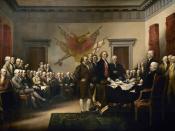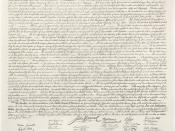In mid-May 1787, fifty-five delegates, representing every state except Rhode Island, assembled in Philadelphia for the single purpose of constituting a better and stronger central government. Four months later, the Constitution of the United States of America was born. In the Constitution, the word slavery did not appear even once; however, the issue of slavery was intertwined with other important issues. Some believe the Founding Fathers took a variety of positive steps that demonstrated their antislavery instincts and that, taken together, drastically reduced the slavocracy's potential area, population, and capacity to endure. Although, as a part of the compromise, the Northwest Ordinance of 1787 outlawed slavery in the Northwest Territories, the Founding Fathers scarcely did anything to condemn or prohibit slavery in the Constitution. The issues at the convention were mainly economical and political; the delegates looked for ways to reduce sectionalism and to produce a more centralized government, not how slavery should be regarded and dealt with.
In fact, almost all the delegates arrived at the Convention with the conviction that slavery was a "domestic institution" of the individual states, that the federal government had no right to impose any restrictions or sanctions on the subject of slavery.
By the time of the Philadelphia Convention, the Northern States are mostly independent from slavery, whereas in the Southern States, slavery takes an irreplaceable role in farming and other menial tasks. In the Declaration of Independence, Thomas Jefferson wrote the famous lines "that all men are created equal; that they are endowed by their Creator with certain unalienable rights; that among these are life, liberty, and the pursuit of happiness." This bold statement roused many doubts among people in the North as well as in the South. Slavery was plainly not compatible with the principles of the Revolution. Given the...


